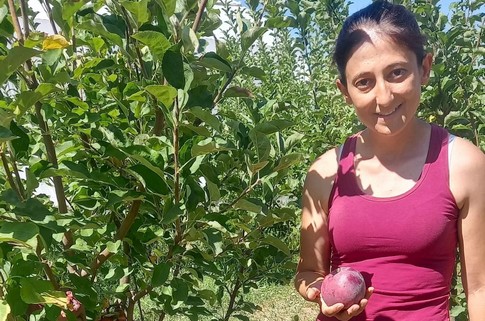
After graduating from the agribusiness and marketing department of the Agrarian University of Armenia, Ani became interested in greenhouse farming and had the idea of owning a greenhouse. By participating in the grant competition announced by the Austrian Development Agency within the framework of the "Green Agriculture Initiative in Armenia" (EU-GAIA) project, Ani achieved her goal: the greenhouse was installed in 2021 with the organization's support.
According to the presented program, Ani planned to organically cultivate non-traditional crops: arugula, kale, Italian mint, Italian basil, and rosemary.
“I knew that these crops were unfamiliar to our consumers, but no matter how risky it was, I decided to cultivate them,” says Ani, “I remember when they started cultivating broccoli in Armenia, and many people thought it was tasteless, but today 70-80% of the population uses it. The same was said about arugula, that it will not be consumed, but I decided to see for myself and it turned out that you should not be guided by other people's opinions.”
Ann posted the announcement of her own product on her Facebook platform under the name Greendream, later after rebranding with the support of the EU-GAIA project, it was called Greenmood. Not only the name was changed, but also the logo and packaging. As a result of rebranding, product consumption is carried out in reliable and environmentally friendly kraft paper bags printed with the new logo.
Ani's family business, which involves her parents Arthur and Lusaber Asaturyans and Anush Asatryan, who deals with advertising and marketing issues, has gained great recognition today. The main customers are from the villages adjacent to Agarak, from Ashtarak, Etchmiadzin and Yerevan.
“I really like the project of the Austrian Development Agency because it supports not only financially, but also promotes business establishment and competent management through training courses, increases product and brand recognition by organizing agricultural product festivals,” says Ani.
Today, the issue of heating the greenhouse has become an agenda item. She says she has found a way out; she will purchase solar panels through a credit agreement next year.
In order to meaningfully use the area adjacent to the greenhouse, Ani created a beautiful garden with apple, almond, walnut, and hazelnut saplings purchased from different nurseries. The garden is still irrigated with piped water, but it will be replaced by a drip system next year.
Ani's dream is not limited to a greenhouse and a garden. She plans to develop rural tourism. For this purpose, a cabin has already been placed in the territory of the greenhouse, which will later become a tea house.
“I have decided to create small demonstration nurseries around the cabin, where tea plants will be grown. There will be information leaflets about the use of each tea plant, tourists will pick any plant, infuse tea for themselves and enjoy. In the future, we will also create an overnight stay option. We will serve ecologically clean food,” says Ani Asaturyan and adds that she owes her success also to her small and dedicated team, which, thanks to persistence and hard work, is trying to turn the wasteland into a paradise.“








